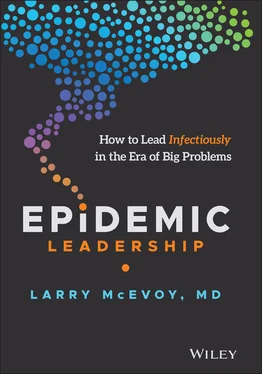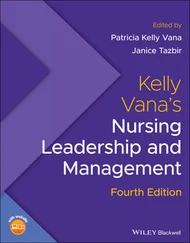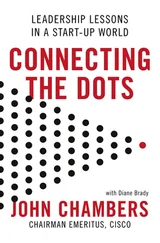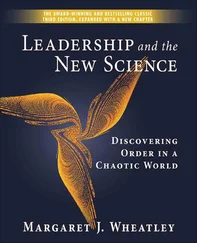Yet the flu rolls on, and so does Ebola, Zika, H1N1, MERS, SARS, and now COVID-19. And so does the exhaustion and the pace. In my native sector of health care, over 50 percent of physicians are burned out, 1 and the literature clearly shows how that physician epidemic impacts quality and cost, not to mention patients' lives, limbs, families, and peace of mind. 2 Over half of executives in health care would quit if they could. 3 If you lost 40 percent of your blood volume in short order, you would be experiencing what we call class IV hemorrhagic shock. We would consider that class of shock a collapse of the 300-trillion cell system known as you, defined by death unless a trauma team resuscitated you. We can see lots of “collapse” numbers like these—honeybees, cancer, environmental data, employee disengagement. The people I talk with—executives, small business owners, consultants, associates, partners, young, old—all note the same trend: things are moving so fast, there's not enough time in the day, and one little person cannot move these big rafts of inertia. Even if we could, we're all exhausted. According to a recent Gallup study, two out of three employees experience burnout at some point in their jobs, with secondary effects on their health and ability to function at home. 4
After the conversation with the nurses, patients began to trickle in as morning arrived. I finished the shift and drove home to where I lived west of town. I opened the ranch gate to our place and paused to take in the land where I lived. It was a quiet ritual of mine that created space between the sights and sounds of my job and the world of my family. Depending on which shift I had just worked, I took a few minutes under the stars or the bright sun to let the insights of the work settle in and to let the sometimes assaulting nature of it wash out onto the ground.
The bright morning air, still cool, held the hint of another hot day, and the slanting sun cast dark shadows on the sun-washed ponderosa coulees and grassy ridges. There is nothing better to wash the olfactory memory of alcohol, blood, urine, and pus from one's brain than the morning smell of sage and Ponderosa pine, nothing better to replace the beeping of monitors and moans of the sick than the breeze wandering in the grassy air. Surrounded by healthier sounds and sights in my sleep-deprived, almost-to-sleep ease, it struck me that the epidemics that cause such ill consequence among us—obesity, cardiovascular disease, HIV, gun violence—were playing by a different set of rules than the ones underlying how I had been taught to respond to them.
I stopped at the corral to feed our two horses. Randomly, my dad's offhand observation about why horses are beautiful wafted across my mind: They've retained their wild shape . We had bought our place six years before, and like so many of the patients I encountered in the emergency department, it was in a degraded state when we found it: overgrazed, eroded, barren of its original biodiversity, its history largely erased. Our hope was to help it heal, and if the ER was an exercise in meeting people in an arc of health that I might never see again, the land was an arc that stayed with me and under my feet, beginning long before me and extending far after. Although the grass crunched yellow in the high summer of a 10-year drought, the ecosystem was surging back to health, not falling behind. Life was recovering here: grasses and shrubs were rebounding, insects and birds were returning, water and soil were recharging. If the ER shift had exhausted me with its physical pace and psychic implications, the sights and smells of the land in the sunny morning inspired and soothed.
I had grown up here in this place of big land and teeming life, raised and surrounded by people who had me in it early and often. I had long wondered how the elegance of biology, so essential to the enduring vitality of every person and every living thing on this planet, did not seem to translate to how we designed organizations, leadership approaches, team dynamics, or even our internal mindsets. The exponential trends that bedeviled me as a doctor and inspired me as a landowner were playing by biological rules; our responses seemed to be so much more mechanical and rigid. And slower. And ineffective. And falling behind.
In the fuzzy haze of near-sleep consciousness I would endure for another 30 minutes before I crashed onto my pillow, a meandering thought surfaced for the first time: if epidemics organize and spread by different, biological rules, what if we could harness the rules and link them to positive realities—to cures, to answers, to ideas, to swarms of positive impact? If I was serious about health, if I was serious about understanding how to multiply adaptive capacity in the face of too much to do and not enough time to do it, I was going to have to answer—positively—the question posed by the epidemics that flowed across the threshold of the ED in that unstoppable wave. How could we create positive phenomena that spread just as powerfully, exponentially, into every nook and cranny, the way epidemics overwhelm our defenses against them?
I wasn't thinking of epidemics as leadership that morning. I only knew at that time that I was on the right side of wanting to be helpful and the wrong side of the way things launched, grew, spread, and moved. From the patients I attended to the land I lived on, I understood biology held vitalizing, relentless capacity. Beyond that, I was out of ideas, and I was too long without sleep.
I went down into the darkest room in my house and fell into the motionless, dreamless sleep of the night worker.
1 1Tait D. Shanafelt, MD, et al., “Changes in Burnout and Satisfaction with Work-Life Balance in Physicians and the General US Working Population Between 2011 and 2014,” Mayo Clinic Proceedings 90, no. 12 (December 1, 2015): 1600–1613, https://doi.org/10.1016/j.mayocp.2015.08.023.
2 2Maria Panagioti et al., “Association Between Physician Burnout and Patient Safety, Professionalism, and Patient Satisfaction: A Systematic Review and Meta-analysis,” JAMA Internal Medicine 178, no. 10 (October 1, 2018): 1317–1331, https://doi.org/10.1001/jamainternmed.2018.3713.
3 3“The Impact of Burnout on Healthcare Executives: A WittKieffer Study,” WittKieffer.com, online survey conducted summer 2018, https://www.wittkieffer.com/thought-leadership/impact-of-burnout-on-healthcare-executives-witt-kieffer-study/.
4 4Ben Wigert and Sangeeta Agrawal, “Employee Burnout, Part 1: The 5 Main Causes,” Gallup Workplace, July 12, 2018, https://www.gallup.com/workplace/237059/employee-burnout-part-main-causes.aspx.
2 The Good Epidemic—Really?
Nature does not hurry, yet everything is accomplished .
—Lao Tzu
In 2008, several years removed from my discouraging night in the ER, I took a role as the CEO of what was then Colorado's largest trauma center. I entered an organization rife with internal strife and external pressures. I had to familiarize myself quickly with a new organization, five thousand new colleagues, teammates, and opinions, and a city-owned health system in a national financial meltdown. Three days' worth of cash on hand stood between us and our debt holders' right to come in and run the place, and we had $320 million of bond debt tied up in the auction-rate bond market, which collapsed midyear, leaving us with worthless and burdensome debt and no bank willing to help us restructure it. Our compliance with federal guidelines was suspect at best, and the penalties for compliance violations were high and included incarceration of the “designated jailable officer”—me. Our finances were sagging after five years of investing in a new hospital with gorgeous brick and glass without replacing the numerous pieces of expensive technology that were reaching the end of their life cycles.
Читать дальше












